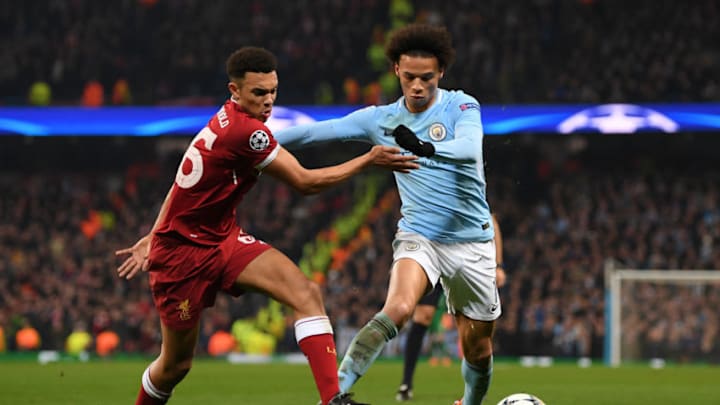Despite his superstar talent, the star City wide man has been unable to lock down a regular starting place.
The great managers of European football undoubtedly see the game differently than the average supporter; it’s why they are sufficiently compensated. However, there is perhaps no discrepancy that divides fans and football’s great minds quite like the enigma that is star German winger Leroy Sané.
The 2017-18 PFA Young Player of the Year is undoubtedly one of the most gifted players on the planet, blessed with pace, dribbling, technical ability, and a poacher’s touch in the attacking third. Combined with the fact that Sané is just 23 years old, one would think he would be the first name onto both the Manchester City and German team sheet, an undroppable young phenom comparable to the likes of Kylian Mbappé.
Yet in some the biggest moments of his career, two of the world’s elite managerial minds have kept Sané on the sidelines, denying him the opportunity to make his mark. World Cup-winning coach Joachim Löw left the mercurial winger out of an aging national team that would eventually crash out at the group stage that was in desperate need of an attacking spark.
On the club side, Sané has seemed to fall out of favor with tactical mastermind Pep Guardiola in the early parts of consecutive campaigns. Upon Sané’s return to former club Schalke in the Champions League last Wednesday, he was left on the bench until the 78th minute when City trailed 2-1.
However, every time the German is doubted by his manager, he proves his world-class quality with stunning performances. Against Schalke, Sané struck a brilliant bending free kick to spark a City comeback in a 3-2 victory that turned the tie on its head. His obvious talent in such moments begs the question: why do his managers bench him?
Goal.com reported that Guardiola had issues with the German’s attitude in September.
Following Sané’s incredible form off the bench as of late, however, the Catalan was effusive in his praise for the young winger.
“Leroy Sané is the best in the world playing out wide,” Guardiola said. “I’d prefer to use him where he is strongest, he’s an incredible player.”
The final product on the pitch clearly warrants a starting place for both club and country, even in teams as competitive as City and Die Mannschaft, yet Sané continues to be overshadowed. If he has issues with motivation or attitude, it is up to the player and his coach to help fulfill the promise of his supreme natural talent.
While Sané holds the responsibility to mentally become the best footballer he can, coaches such as Löw and Guardiola recognize his gifts and understand that they must put him in a position to succeed.
Perhaps it will be these early benchings or missing the World Cup that will drive Sané to become one of the best players in the world. If a player only hears about his greatness, where is the adversity that motivates him to achieve his potential?
Guardiola, who formerly managed Barcelona and Bayern Munich, has a reputation for maximizing the talents of his players through both an attack-minded style of football as well as world-class man management and motivational skills.
To that end, Guardiola knows and utilizes the emotional needs and desires of his players in order to help them find their peak form. He has heaped praise upon City midfielder Bernardo Silva, which has helped the Portuguese midfielder grow into one of the Premier League’s burgeoning stars, while he understands that Sané can manage and even thrive under adversity.
Guardiola realizes that he has a generational talent in the German winger, and it can be said that Sané’s career is in safe hands as long as he shows the commitment to excellence demanded by his manager.
The young star has shown his ability to handle the pressure and shine in the biggest moments, and while we may not yet understand what it takes to get the best out of Leroy Sané, perhaps Guardiola’s motivation is the very thing molding him into the world-class superstar he seems destined to become.
